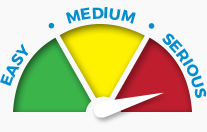IRS Letter CP21A
Why are you receiving this letter?
You received IRS letter CP21A because the IRS has made the change(s) to your tax return for the tax year specified on the Notice that you requested, or due to information the IRS received. You owe money on your taxes as a result of the change(s) the amount you owe.
For this Notice example, the taxpayer requested removal of all penalties. The IRS granted the penalty relief and removed failure-to-file and failure-to-pay penalties. The remaining balance owed is taxes and interest. Learn more about removing IRS Penalties.

- You can pay in full online at www/irs.gov/payment.
- You owe less than $10,000 and would like to set up an installment agreement. You can call the number on the top right hand corner of your IRS letter and the IRS will give you up to 72 months to pay back the taxes

- Your tax balance is less than $25,000.
- You don’t have unfiled tax returns.
- You are unable to pay back the taxes in full.
- You would like to discuss this with someone not working for the IRS to understand what is going on and the options you have.

- Your tax balance is greater than $25,000.
- You have unfiled tax returns.
- You are unable to pay back the taxes in full.
- You would like to negotiate down the tax balances.
What should you do?
Read your notice carefully. The Notice explains how much you owe, tax period, and tax form. On our Notice example, the balance is due for 2010 tax period and Form 1040.
If you disagree with this notice, contact the IRS at the number listed on the top right corner of your notice. Notify the IRS representative that you received a CP21A notice and you want to know what the IRS received that created the change to your return. If you still disagree with their explanation, contact our office to discuss your options and appeal rights.
If you agree with this notice, you have a balance due and owing to the IRS.
What can you expect next?
IRS letter CP21A is considered a tax bill. The IRS asks that you pay the balance due in full. You do have options, but if the tax bill is left unpaid, the IRS may move forward with filing Federal Tax Liens and/or Tax Levies on your wages, bank accounts, state & federal tax refunds, etc.

